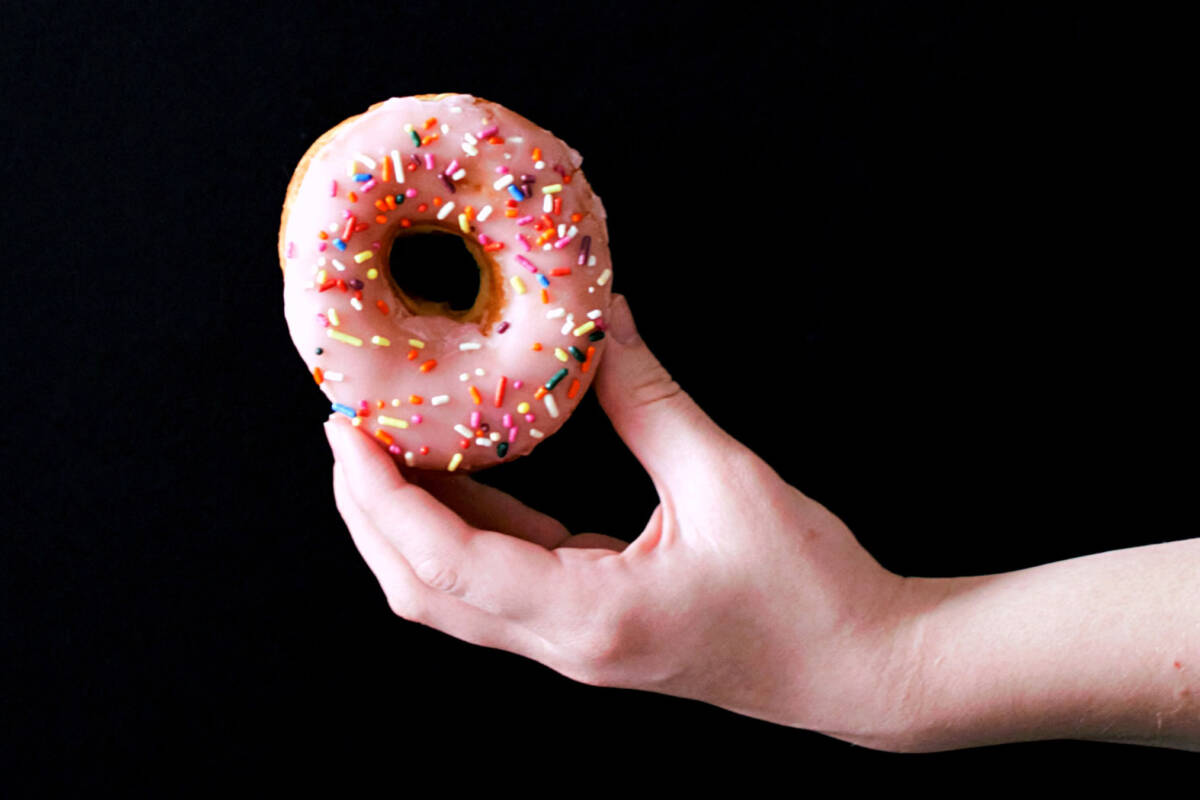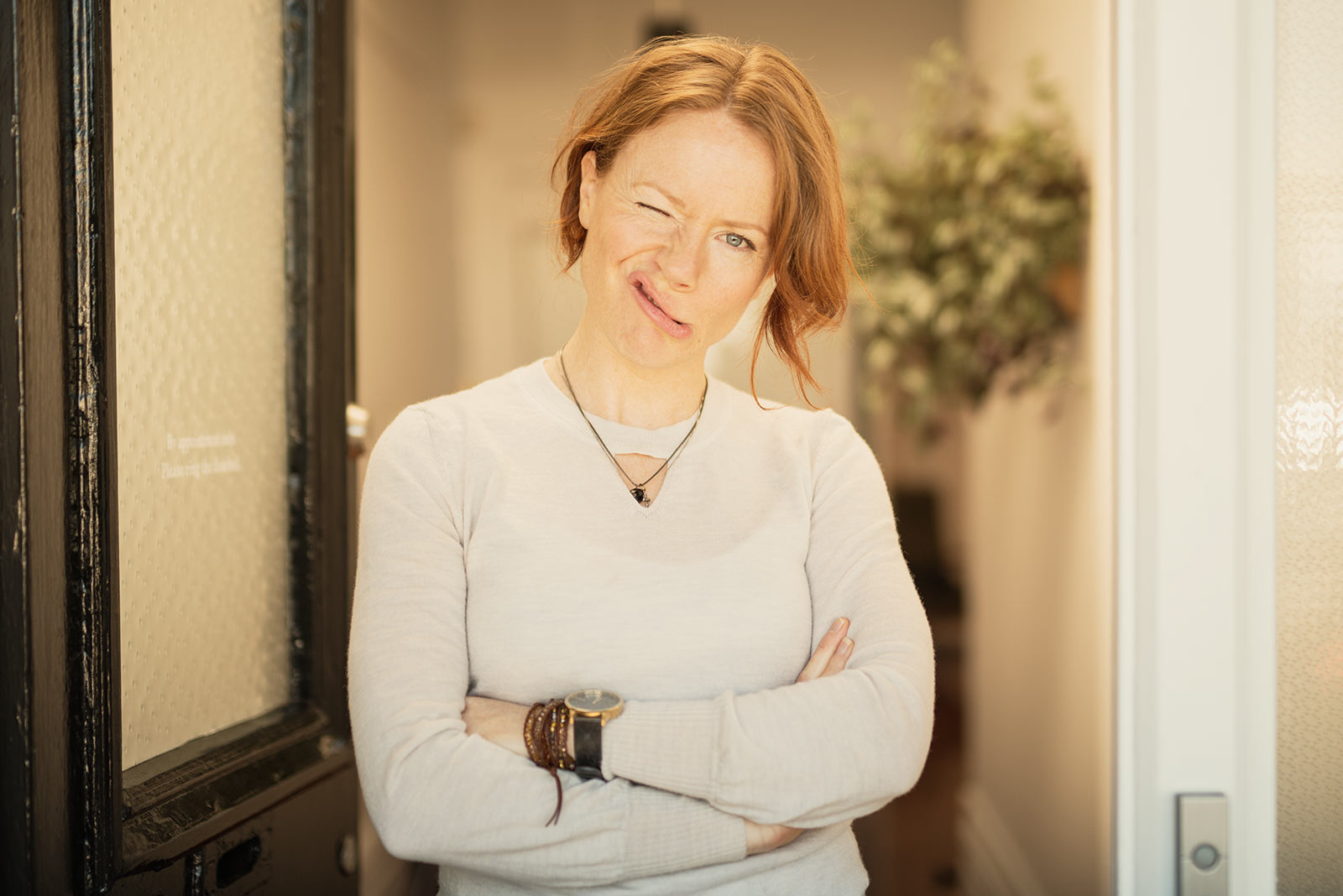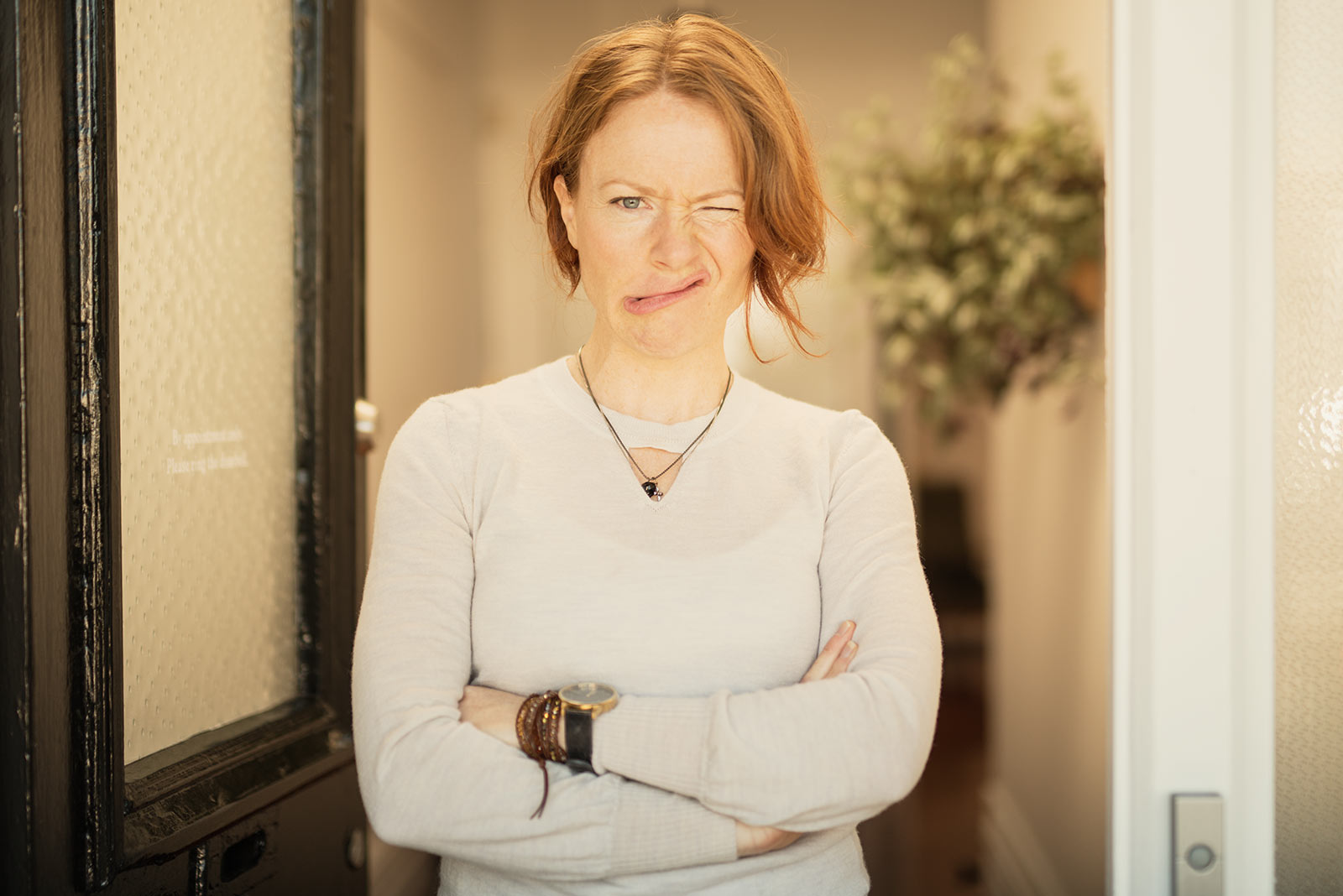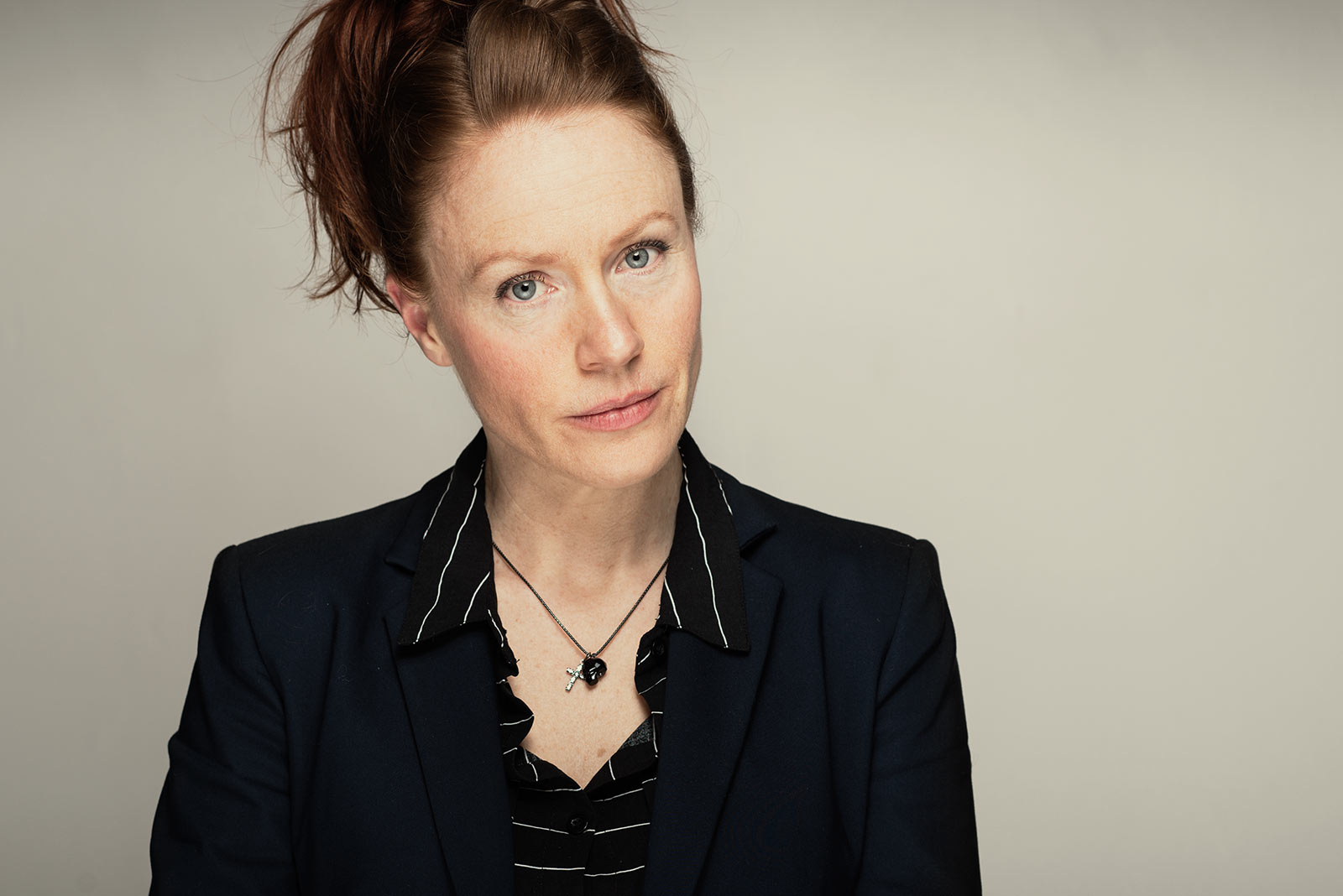
125—
Are you at a loss to explain your failed weight loss?
If you have been diagnosed with depression and you are being treated for this condition
This information does not replace the current advice of your mental health professional, GP, or natural health practitioner.
If you suspect you have depression
If you believe you may suffer from this mental health condition, then please speak to someone about this — a trusted colleague, friend, or family member. They can help to support you and guide you to the appropriate level of professional health care.
NEED TO TALK? 0800 111 757
Talk to a trained counsellor at the Depression Helpline about how you are feeling or to ask a question.
Until recently, I would never have admitted this to anyone — let alone broadcast it on the internet.
This is because there is still a massive stigma attached to depression. As a society we’re not getting any better at accepting that depression is a treatable biological imbalance, and not some kind of moral or psychological failure. Sufferers of this mental condition aren’t ‘mental’. Depression is actually a common symptom of other health conditions such as persistent stress and chronic inflammation.
It might come as a shock to some people, but no-one considers this mental condition as more of a mark of disgrace than the actual sufferers of depression themselves. We really give ourselves a hard time for feeling ‘down’, irritable, pensive, unmotivated, disinterested, and hopeless. However, we need to learn to accept and understand our mental state, otherwise how can we ever expect everyone else to?
I didn’t actually tell anyone that I had depression until my early 30s (although I’ve suffered with it — to one degree or another — for as long as I can remember). I didn’t tell anyone because I didn’t want to appear weak and I also didn’t think that they would understand. Instead, I went to great lengths to cover it up. I used humour to over-compensate. This tactic distracted people — including myself — from how I was really feeling.
Note: If you don’t laugh, you’ll cry. But, at the time, joking does indeed make you feel better.
I eventually had to start telling people about my mental condition — but only on a need-to-know basis — as at times I was finding it difficult to mask my emotions. However, I was soon to discover that I was right about how friends & family would react to me confessing that I was ‘struggling with life’ — they didn’t understand at all. They weren’t unkind, but they couldn’t accept or deal with what I was saying to them. I’ve been told off by one friend — for keeping a secret from her (which became the focus of the conversation instead). I’ve had it brushed-off or poo-hooed by others. Some haven’t believed me at all — because I’m ‘bubbly & funny’ — uh huh. Strangely enough, most depressive types don’t call attention to themselves by going around looking gloomy all the time.
Note: Because I know what I’m like, if I encounter seemingly humorous or flippant people in my practice, I always ask the question, ‘are you really okay’? And then, ‘Are you sure you’re sure?’
I decided to ‘fess-up’ in this blog-post for three reasons:
The first reason
Clearly, I’m not the only person who suffers from depression. I’m seeing more and more people in my practice who are not only experiencing this mental condition but who are also suffering equally from other mental health conditions such as: stress, anxiety, phobias, OCD, insomnia and addictions. (They are also suffering from a lot of guilt.) From what I’ve observed, our mental health is becoming increasingly fragile due to the unremitting demands we are faced with.
Note: A 2011/2012 New Zealand Health Survey found that 14.3% of New Zealand adults had been diagnosed with depression at some point in their lives (and 6.1% had been diagnosed with anxiety)1.
The second reason
I recently had an incident with a man-friend where his reaction to me admitting that I had depression was very sobering. (This somewhat disturbing conversation follows shortly).
To be honest, my initial reaction to this confrontation was: ‘Well, that’s the last time I share that very personal piece of information about myself with anyone’. But later, on reflection, I decided that closing down wasn’t the right reaction. You should be able to freely express your emotions without being condemned — damn it all!
The THIRD reason
I also recently found out (and I have this under good authority from someone who works in the industry) that the media do not like talking about natural therapies for depression. Simply put, depression is a medical condition that — apparently — only synthetic drugs can ‘fix’ or that trained professionals such as Psychiatrists & Counsellors can support. This is why you’re very unlikely to see any articles about using alternative therapies to treat depression in the mainstream media. This is a concern because there are a number of well regarded, independent, clinical studies that suggest that the ‘mainstream medication’ prescribed for depression is often ineffectual2,3,4,5.
Yes, you read that correctly. This medicine doesn’t work very well — or in a lot of cases it doesn’t even work at all. However, there are many studies that show that natural medicine works very well for depressed people6,7,8.
So, I say: F**K them all: my man-friend; all the people who think like him; and the mainstream media who are essentially keeping important information from us.
We’ve got a problem — and things won’t get better until we all start talking honestly about it.
Therefore, here on LISA SAID SO, I will be discussing ‘Depression & Natural Medicine’ — the supplements & medicinal herbs that have been scientifically proven to help manage depression.


As I said, not long ago, a man-friend of mine really Pissed. Me. Off.
I told this person that I suffer from depression — it just ‘came-up’ in a conversation. (Luckily, I wasn’t looking for help or anything — as I know how to manage my condition. And, obviously it’s easier to admit to people when you aren’t actually feeling depressed at the time.)
I don’t know what response I was expecting to get, because to be honest, I hadn’t planned on telling him. But, I certainly wasn’t anticipating an attack!
“Are you on medication?”, he demanded.
“Ah — no… I’ve never actually taken medication for it…”, I said.
I’ll try to remember what he said from here:
“Well, that’s lucky because I was about to judge you very harshly. Clearly, you don’t have depression if you’re not being medicated for it — you’re just suffering from ‘overwhelm’. However, if you did have depression — and you were taking medication for it — then I would think that you were a ‘cop out’. I tell anyone with this condition that there’s nothing wrong with them; that they’re actually just being annoying, lazy, sad-sacks and they simply need to ‘snap out’ of it and get over themselves…”
“Blah, blah, blah.”
“I’ve never suffered from this condition myself (not that it actually really exists…). But if I did, then I would have more right than most — considering what’s happened to me in my lifetime…”
“Blah, blah, blah, bloody blah…”
My man-friend, who FYI has no medical or psychological training what-so-ever, thinks he possesses the magical power to simply SNAP someone out of depression.
Please note: I think that, because he got so carried away with his uneducated rant, my man-friend forgot that his friend is actually a practicing Naturopath.
“I manage my depression naturally”… is what I would have said, if this know-it-all was in the least bit interested in learning about my experience.
I am very grateful to this man-friend for riling me up enough to finally getting around to writing this much-needed blog-post.
Thank you ‘man-friend’ for your ignorance on this subject, your unwillingness to actually listen to me, and your total lack of empathy for your friend 🙁
This blog-post is dedicated to you (as well as to the other people that think like you).
I am VERY lucky to have an incredibly understanding, kind and supportive partner who just ‘gets’ me. He’s also extremely good at keeping a watchful eye on me. Sometimes I get overwhelmed with work — like most people — and I forget to make time for myself. Sometimes (again, like most people), I get cocky and think I’m now ‘fixed’. So I stop taking my natural medicine as religiously, or I stop exercising as regularly. If this happens, and he catches the merest whiff of melancholy from me, he’ll tell me that I’m not following my own Naturopathic advice — which annoys the living bejesus out of me…
But, it’s also something that I cannot deny — so it proves very effective in getting me back in line.
It’s truly awesome to be so thoroughly well cared for! He’s a keeper. Hands-off ladies 😉
Thank you, DMF — you are my bestest bud and I love & appreciate you.
You’re the greatest xo

Unfortunately, there is a lot of stigma still attached to this mental condition. Many people who don’t experience depression don’t ‘believe’ it exists. Which is ironic, because (while I like to think that) I don’t suffer from stupidity, I’m very open to the fact that it exists in others…
Reality check: We’re not doing this on purpose. No-one in their right mind would actually choose to feel down on a regular basis. I mean, come on! When you suffer from depression you physically can’t think more positively.
Depression is an actual physical condition — and it’s not all in our head. The struggle is real, my ‘friend’.
Let me explain.
Depression is a maladaptive alteration in the structure and function of the brain, which ultimately results from the over-activity of neurotoxic factors and the under-activity of neurotrophic factors. (I’ll explain all this complicated stuff in part-two).
A person with a brain imbalance, may have experienced any number of factors that caused them to lose their mental and emotional resilience. Therefore, when treating a sufferer of this condition you don’t just look at the site of the problem — you look to see what is happening within the whole body that is impacting the brain.
I see many clients who start taking medication for depression that begin to experience symptoms of anxiety. This can be because depression can mask anxiety, or because the medication is now causing them to experience anxiety.
I also see people who are taking medication for depression, but now just feel numb — they don’t feel much of anything: happy or sad.
Treatment-Resistant Depression is where a person does not respond to anti-depressant medication. Wouldn’t it really suck, to take what you thought was your ‘only option’ or your ‘last hope’ — and for it not to work?! You can see how some people start to feel pretty desperate…
Fortunately natural medicine can be used to support the efficacy of these medications.

Nowadays, if a client comes to see me suffering with mild to moderate depression, I briefly share with them that I too suffer from this condition — but I’m only symptomatic if I don’t carefully manage my condition through diet, exercise, lifestyle and supplementation.
Note: I’ve never been clinically diagnosed with depression. I didn’t find it necessary to have someone tell me something about myself that I already knew.
I tell my clients this personal information about myself, not to equate my experience with theirs — as all experiences are individual — but to let them know that to some extent, I understand what they are going through. (I like to reassure them that they are in a safe space to share their honest feelings.) Then, armed with this true account of what they are experiencing, as a Naturopath & Medical Herbalist I can recommend natural ways of managing this condition. Alternatively, I can recommend supplements & herbs that may help their current medication to work better.
Note: I do not work in ‘mental health’ per se – I’m not a Counsellor, Psychologist, Psychotherapist, or Psychiatrist. (Nor have I ever felt the need to seek this type of therapy for my own particular ‘brand of depression’.) Therefore, I’m not qualified to counsel anyone in mental health conditions, and I always refer clients to the relevant professionals for this portion of their health care. Generally speaking, I have found that the more you support the person from all angles, the more other therapies benefit them. As with most things, it’s about the sum of the parts.
In order to tame my depression I literally had to ‘give up’ — meaning that I had to stop resisting what I was feeling. I had to stop fighting myself and admit that this prevailing sensation I was experiencing was ‘depression’ — as I thought it was just the way I was. And, to even get to this point of acknowledgement and acceptance, I had to come to the realisation that I didn’t actually need to have anything in particular to feel sad about. There didn’t need to be a death in the family, a break-up, or a personal failure of some sort. I also didn’t need for anything particularly bad to have happened to me (physical or sexual abuse).
Although, if you’ll permit me to digress here, I’m sure the fact that I did suffer ongoing mental stress from around the ages of 8–18 didn’t help with my depression. During this time, I had to brace myself on a daily basis at school as I apprehensively waited for the inevitable tormenting about my displeasing physical appearance — because I am a Redhead.
Teasing ‘Gingers’ might be considered harmless fun for the masses, but from a member of this minority’s perspective — it f**cking sucks. It’s not very nice to be consistently told that you are ugly and unacceptable — to be looked at in ‘disgust’ (I’d like to say I’m exaggerating here…) simply because you don’t possess what most people consider attractive physical characteristics. I was a super shy & sensitive little kid who just wanted to blend into the background but who unfortunately, ‘stood out like dogs balls’ (to borrow one of my father’s delightful sayings).
Before their torments, as far as I can remember, I was blissfully unaware of myself. I am now, however, a terribly self conscious adult — but I hide that pretty well too! 🙁
Kids can be right shits sometimes.
Be warned: If I catch any kids tormenting my fellow little redheads… I will pull their bloody ears off! Little toe rag bullies.
(It’s my blog and I’ll rant if I want to 😉 )
As it turned out, I didn’t need anything in particular to be depressed about. I was good at generating the feeling of melancholy all by myself.
I’ve seen clients, time and time again, who haven’t experienced a ‘big life trauma’ or who don’t have anything in particular to feel ‘down’ about — who therefore feel guilty about admitting that they are suffering from depression. They know rationally, that by all accounts, their life is great (they have a loving partner, healthy kids, a nice house, a stable income, and they live in lovely little New Zealand). However, regardless of all of this, they still feel inherently gloomy.
Note: This is why I used to hide it, because I couldn’t find a logical reason for constantly feeling bad. And, if you were to tell someone who wasn’t familiar with depression then you would come-off looking ungrateful, illogical, petty or just plain crazy. And, you just don’t need the judgement when you’re already condemning yourself for feeling this way.
Yes, depression can be situational (you’re just going through a ‘bad patch’, you’re lonely, or you’ve recently been made redundant), or it can be kicked-off by something (abuse or bullying). But a lot of the time, it ‘just is’. It’s just a matter of how your brain has become structured — and therefore how it is currently functioning. For a variety of reasons, when you suffer from depression, your brain isn’t as resilient as it should be to certain stressors (I talk about this more fully in part-two).
I recommend that instead of feeling guilty about being depressed, try to simply accept the inherent sadness. Otherwise your brain desperately tries to make sense of it by naturally linking it to all the ‘sad shit’ out-there. You know — things like world hunger, mean people, global warming… and baby seals being clubbed on the head for their fur-skin pelts. Trust me, all of this just makes things so MUCH worse for you 😉
Note: Aspirational Social Media is NOT helpful in this respect either. It is a bunch of contrived clap-trap designed to make you feel bad about feeling unmotivated & unappreciative. My advice? Just use your phone for making and receiving calls on.
So, the reason you’ve been looking for — as to why you feel depressed — is that your brain isn’t very healthy at the moment. And, the more your brain is unhealthy, the more you will starting running it unhealthily. Which is why you need the counselling or the psychotherapy to help you understand, validate and monitor your way of thinking — so that you don’t exacerbate your fragile condition.
If anything, I hope this realisation brings you some relief — and that you no longer seek to justify your depression, or to continuously analyse it, or that you stop trying to hide it from your ‘people’, or worse still — that you hide it from yourself. And, rather than ruminating on the world’s problems, feeling guilty or trying to figure out what’s wrong with you, instead spend this time supporting your brain health with the necessary nutrients it requires to rewire itself so that it may happily run itself correctly.
I’ll be taking you through the following three areas:
Antidepressant medications have a high rate of prescription. Of these drugs, SSRIs (Selective Serotonin Reuptake Inhibitors) are the most commonly prescribed. You may be more familiar with this type of medication by its various trade names: Citalopram, Escitalopram, Paroxetine, Fluoxetine (Prozac), and Sertraline.
Unfortunately, while widely prescribed, these drugs fail to exhibit overall meaningful clinical efficacy. Studies show that SSRIs are “only moderately superior when compared to placebo”.6
This is because depression is not just a simple matter of a single neurotransmitter deficiency — and in fact, it may not even be due to any type of neurotransmitter deficiency at all9.
This would explain why some people experience Treatment-Resistant Depression.
When you’re looking for the drivers that are causing depression, the search shouldn’t be limited to looking just above the neck. The whole body needs to be addressed!
There are many factors that can feed into a depressed mental state. These factors can include severe or unrelenting stress, poor diet/nutritional deficiencies, inflammation, infection, decreased mitochondrial function, and seemingly unrelated health conditions such as IBS, pain syndromes, and Thyroid dysfunction10.
There are many supplements & herbs that can be used to positively ‘rewire’ your brain: B-group vitamins, magnesium, EPA (from fish oil) Co-Q10, Vitamin D, Zinc, N-acetylcysteine (NAC), Turmeric, Saffron, Siberian Ginseng, and Rhodiola.
There are also many other supportive therapies — that were once considered ‘soft science’ — that are now proving effective in the treatment of depression. These include such things as taking regular exercise and developing a supportive social network.
John Kirwan is a fabulous ambassador for depression (and anxiety). He is doing some fine work in this area by encouraging early recognition and help-seeking.
Again, I say: F**K them all: my man-friend; all the people who think like him; and the mainstream media who are keeping important information from us.
And — again, I hope you’ll join me for part-two of this blog-post where I can share more about this important topic with you.
Power to the people.
Peace out. x
Lisa Fitzgibbon is a degree qualified (2006), experienced and registered Naturopath & Medical Herbalist. She runs her own private practice – OOMPH in Grey Lynn, Auckland, New Zealand.
Lisa has been involved in the Natural Health industry for 16 years. She draws on her professional training and experience, as well as her own personal experience to bring you realistic, holistic health advice.
Book onlinehttps://www.mentalhealth.org.nz/assets/Uploads/MHF-Quick-facts-and-stats-FINAL.pdf
Zarate C, et al. New paradigms for treatment-resistent depression. Ann N Y Acad Sci 2013;1292:21-31
Bschor T, Kilarski LL. Are Antidepressants Effective? A debate on their efficacy for the treatment of major depression in adults. Expert Rev Neurother.2016 Feb 18.
Andrews PW, et al. Primum non nocere: an evolutionary analysis of whether antidepressants do more harm than good. Front Psychol. 2012 Apr 24;3:117
Lacasse JR, Leo J. Serotonin and depression: a disconnect between the advertisements and the scientific literature. PloS Med. 2005 Dec;2(12):e392
Abdou E, Hazell AS. Thiamine deficiency: an update of pathophysiologic mechanisms and future therapeutic considerations. Neurochem Res. 2015;40(2):353-61
Scalabrino G, Buccellato FR, Veber D, Mutti E. New basis of the neurotrophic action of vitamin B12. Clint Chem Lab Med. 2003 Nov; 41(11):1435-7.
Dorri SA, et al. Involvement of brain-derived neurotrophic factor (BDNF) on malathion induced depressive-like behaviour in subacute exposure and protective effects of crocin. Iran J Basic Med Sci.2015;18(10):958-66
Dale E, Bang-Anderson B, Sanchez C. Emerging mechanisms and treatments for depression beyond SSRIs and SNRIs. Biochem Pharmacol. 2015 May 15:95(2):81-97
Aina Y, Susman JL. Understanding comorbidity with depression and anxiety disorders. J Am Osteopath Assoc. 2006 May; 106(5 Suppl 2):S9-14.
Subscribe to LISA SAID SO
Subscribe to the LSS newsletter to get updates on a very irregular basis.
Sorry for the interruption!
You seem to be interested in what Lisa has to say. To be updated when new articles are published, or we have news to share, enter your email below. Thanks!